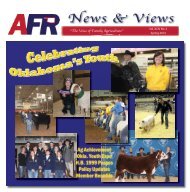Oklahoma Farmers Union - American Farmers & Ranchers
Oklahoma Farmers Union - American Farmers & Ranchers
Oklahoma Farmers Union - American Farmers & Ranchers
Create successful ePaper yourself
Turn your PDF publications into a flip-book with our unique Google optimized e-Paper software.
of patron-owned co-ops to distribute electric power. Cheek and OFU had been some of<br />
its’ loudest supporters. <strong>Farmers</strong> <strong>Union</strong> had pressed for the cooperative approach while<br />
many others still looked to the profit-type utilities. That same year OFU members<br />
rejected a second AAA because they considered crop reduction principles too radical.<br />
In 1937, Cheek continued his fight calling for legislation to insure graduated land<br />
taxes, homestead exemptions and low interest loans to a national radio audience over<br />
NBC. While some <strong>Oklahoma</strong>ns opposed the New Deal, Cheek continued relentlessly.<br />
The Federal Crop Insurance Program became law in 1938.<br />
In 1940 Tom Cheek testified in Washington, D.C. for a <strong>Farmers</strong> <strong>Union</strong> proposed<br />
Cotton Income Certificate program. Before year-end Cheek returned to Washington to<br />
take credit recommendations from a 20-state emergency credit meeting to the Senate<br />
Banking and Currency subcommittee. Cheek’s testimony reported that farm tenancy<br />
rates had climbed to 61 percent in <strong>Oklahoma</strong>. That same year, he testified before<br />
Congress on the issues relative to “why Okies were leaving the state.”<br />
In 1941 Congress raised price supports on major agricultural commodities to 85<br />
percent of parity and Cheek again testified before the House Committee on Agriculture.<br />
On December 8, one day after Pearl Harbor, Cheek sent a wire to President Roosevelt:<br />
“<strong>Oklahoma</strong> <strong>Farmers</strong> <strong>Union</strong> pledges our unwavering support to this war against Japan.”<br />
In 1944, <strong>Farmers</strong> <strong>Union</strong> chiefly advocated creating a rural telephone program within<br />
REA and became reality in 1949.<br />
Homer Duffy became state president and in 1945 took to the national airways on a<br />
CBS radio broadcast to support President Truman’s federal budget proposals that called<br />
for not reducing expenditures or shifting to a military build-up.<br />
Duffy and state secretary Zed Lawter worked aggressively for <strong>Farmers</strong> <strong>Union</strong><br />
objectives including support for the Brannan Plan farm program, and for 100 percent of<br />
parity supports for all major crops.<br />
In 1945, OFU launched bus trip campaigns to Washington, D.C. to engage in<br />
grassroots lobbying, three years prior to the national organization. In 1948 the group<br />
recommended a two-year extension of price supports at 90 percent of parity which was<br />
adopted.<br />
At home Duffy summarized successes of the union in recent years include state<br />
legislation sponsored OFU to secure tax exemptions for gasoline used in tractors and<br />
farm machinery, homestead exemptions, a graduated land tax to exempt 640 acres of<br />
cultivating land, no taxes on land used for grazing livestock and the passage of a bill to<br />
establish rural telephone cooperatives.



